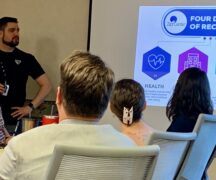By JULIE CARLE
BG Independent News
The Cocoon helped nearly 1,000 Wood County survivors of domestic and sexual violence last year and answered more than 6,000 calls from people seeking help such as legal assistance, shelter or to go to the hospital.
Children’s Resource Center is one of Ohio’s few youth services agencies that offers Mobile Response and Stabilization Services 24 hours, seven days a week, 365 days a year.
The Cocoon and CRC were the most recent local mental health and substance use service providers to present information to the Wood County Alcohol, Drug Addiction and Mental Health Services Board in preparation for budget appropriations and contract approvals for Fiscal Year 2025. The board will approve the budgets and contracts later this month for the new fiscal year, which begins July 1, 2024.
The Cocoon, celebrating its 19th year, is known for its emergency shelter for domestic and sexual violence survivors. Executive Director Kathy Mull told the board that the agency also has built a robust education and prevention program in the community.
“We ensure that survivors experiencing any type of gender-based violence has access to services when and how they need them to impact them the most,” she said. “As much as we want to be a safe haven for individuals in our community who are experiencing violence, we also want to actively reduce the rate of violence that we are seeing and the length of time services are needed.”
In addition to helping survivors of domestic and sexual violence, they also work with people who have experienced sexual trafficking, sexual harassment and adult survivors of child abuse.
The shelter has 24 beds for women and men with or without children and a safe pet program that is one of only a few shelters that allows survivors to bring their pets with them into the shelter. Last year, there were 109 adults and children housed in the emergency shelter for an average of 780 hours, Mull said.
In the past two years, the Cocoon has started a youth program as their needs have continued to grow. They have worked with 50 children who have witnessed violence and/or experienced violence themselves.
The agency has a youth advocate on staff to work with people in the community who are experiencing violence in their homes and a full-time housing specialist who helped place 73 families in safe and stable housing last year.
Economic empowerment, transportation and case management/advocacy are included in the Cocoon’s services. They bridge the gap for mental health and substance abuse issues, working with other local agencies to provide treatment.
Recently they have added a criminal justice advocate to help individuals navigate the system and an in-house medical program that allows people in the shelter to see a doctor on-site for emergent health issues. These initiatives were funded through other networks and private donors.
“We are asking (from WCADAMHS) for funds to ensure 24/7 staffing in the shelter and for the in-house hotline” and prevention services, Mull said. The board also has traditionally matched the funds the Cocoon receives from the Victims of Crime Act.
That funding has dwindled significantly in recent years, she explained. In 2019, they received $635,000; this year, they received $255,000, and they were told to anticipate a cut again this year to approximately $100,000.
Local youth and families benefit from CRC services
Children’s Resource Center prides itself on providing child-centered, family-focused services that are equitable, accessible and affordable. They work with community partners, schools and surrounding services to provide school-based, home-based, prevention and a variety of outpatient services, said Jennifer Thrasher, director of outpatient services at CRC.
The Mobile Residential Stabilization Services program provides crisis care for youths “in the least restrictive environment in hopes of decreasing out-of-home placements,” she said. “We provide the initial crisis assessment, and we can offer four to six weeks of crisis stabilization services.”
MRSS staff go into homes, if possible, to see the natural environment and identify barriers that might stop families from being successful. “We can wrap support around that in the home for four to six weeks,” she said.
MRSS transportation and services continue to reduce barriers to treatment. “One of the reasons our day treatment is so successful is being able to pick kids up, and take them home,” Thrasher said.
At discharge, 99% of the families identified that they defined the problem.”It’s not a psychiatric-defined crisis; the family has said, ‘My kiddo is not going to school,” Thrasher said. “We consider that a crisis and respond and give them the same services as if they said, ‘My kiddo is struggling with suicidal thoughts and wanting to hurt themselves.”
Family Functional Therapy (FFT) is an evidence-based model for youth between 11 and 18 years old who are often involved in multiple systems, such as juvenile justice and JFS, and struggling with mental health issues. Family therapists work with the entire family. They work to “get the behavior under control and reestablish the healthy hierarchy in the family,” she said.
The average wait time from referral to service is about two weeks. FTT has worked with 42 families in the current fiscal year, doubling their projections for the year. CRC is working to hire one to three additional family therapists for the program.
Prevention programs include a unique program that serves youths outside of Wood County in 22 counties in different capacities such as early identification and prevention. CRC also collaborates with Jobs and Family Services to provide prevention services to families for whom JFS has screened or received a call.
“We are not requesting funds from the board” for the school-based, JFS and transitional-aged youth programs as the agency works to make the programs more self-containable, she said.
The residential funding request for the new fiscal year is $122,000 less than the current year and the MRSS funds request is unchanged from this year at $101,000.
CRC Chief Executive Officer Melanie VanDyne updated the board on the plans for the Wood County Youth Care Continuum, which was awarded an American Rescue Plan Act (ARPA) grant for more than $6.6 million. CRC will utilize the funds to provide “a full continuum youth crisis center for the northwest Ohio region that will target, support and strengthen the mental health crisis continuum across Ohio,” she said. (A detailed story will be published at a later date.)
Chess Health update
Amanda Kern said the paperwork for a no-extra cost, nine-month extension with CHESS Health is being reviewed before going to legal for approval. The agreement holds CHESS Health accountable for providing deliverables on a phone app to help screen for substance use disorder and provide access to a peer-support network.
Earlier this year, the board learned the company had made little progress since the $82,000 contract started July 1, 2023. The company offered a six-month extension at no extra cost, but the board asked that the extension be for nine months. In the meantime, Aimee Coe, director of community programs, has been meeting with CHESS monthly for updates. She reported they have created a screening tool regarding drinking and drug use that is available on the WCADAMHS website. Coe will update the company’s progress to the board later this month.
The board approved resolutions to update agreements with four service providers: Zepf Center, Arrowhead Behavioral Health, Unison Health, and Ridgeview Behavioral Hospital.
For the Zepf Center, the board agreed to increase the maximum funds payable to provide substance use disorder services.
Arrowhead Behavioral Health exhausted its maximum funds payable in January; the agreement increases the maximum funds payable not to exceed $40,000 or 50 days.
Unison Health will get an increase in its fee-for-service and funds for a vehicle, which was approved under state opioid and stimulant response funds.
The agreement with Ridgeview Behavioral Hospital, which provides inpatient adult psychiatric and co-occurring substance use disorder treatment, was approved to begin using the facility on a more regular basis at a rate of $750 per day.
Kern visited the hospital when an emergency placement was needed at the facility in Middlepoint, Ohio. “It was the first I’d heard of them. They also provide adult care for 65-plus, which is one of the hardest populations to place,” she said. She praised the facility for its thoughtful and meaningful discharge planning and coordination of care, including transporting individuals to and from the hospital.
In other business, the board:
– Discussed plans for the 1.6 mill renewal that will be on the ballot in November. A levy committee is being organized that will include a member of the board, representatives from various providers and community members. Kaylee Smith, manager of marketing and communication, will work with the committee starting in June with plans to kick off the campaign before the Wood County and Pemberville fairs.
– Heard about Ohio House Bill 344 which eliminates the ability to seek replacement levies. Kern said the Ohio Association of County Behavioral Health Associations is working with other state agencies that would be adversely affected by the change to submit opposition to the legislation.





